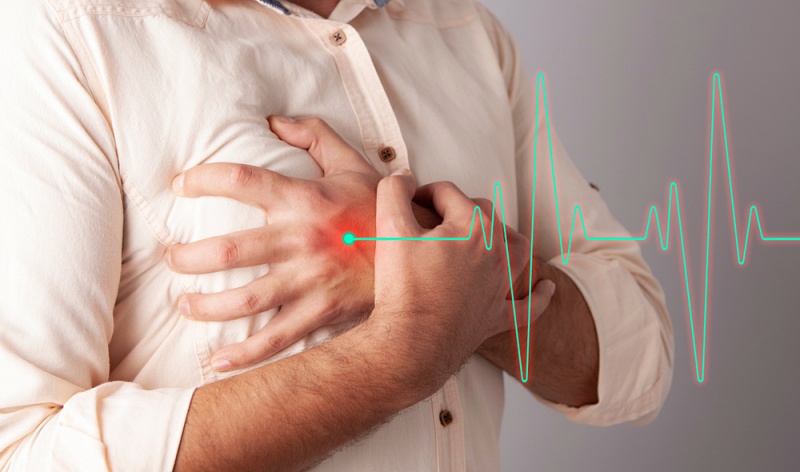How Long Can You Live With Heart Disease | Congestive Heart Failure Life Expectancy
How long can you live with heart disease? What are the early signs of heart failure? Is there a way to protect your heart? We'll break it down for you.
READ: Stroke vs Heart Attack | Heart Attack vs Stroke | Difference Between Stroke and Heart Attack
How Long Can You Live with Heart Disease | What You Need to Know About Congestive Heart Failure?

What Is Heart Failure?

Heart failure (HF) is when your heart fails to pump oxygen-rich blood to your other organs. It's important to note that heart failure is not the same as cardiac arrest.
Your heart continues to pump, but for some reason, it can't send enough blood to the rest of your body.
How Prevalent Is Heart Failure?

According to a circulation published by the American Heart Association (AHA), in February 2021, between 2015 and 2018, around 6 million Americans over 20 years old were diagnosed with heart failure.
AHA projections also show that by 2030, around 8 million Americans over 18 years of age may suffer from heart failure.
One 2017 study reports that there are 915,000 new HF cases in America each year.
And in 2012, HF cost Americans reported $30.7 million.
According to 2017 data, globally, 64.3 million people are suffering from heart failure:
- 29.5 million men
- 34.8 million women
How Long Can You Live with Heart Disease?

According to a 2017 review, heart failure survival rates are:
- 80-90% after one year
- 50-60% after five years
- 30% after 10 years
Ultimately, your outlook could depend on the severity of your condition and how well you manage HF. Each patient is unique, and it may be difficult to determine your chances of survival.
Doctors dubbed heart failure as an emerging pandemic as early as 1997. But with current medical advancements, innovations, and emerging treatments, there may be hope yet for HF patients.
What you can do now is take a more active role in your health and keep your doctor on speed dial. Understand your risk of heart disease now, and you might be able to prevent heart failure in the future.
What Are the Causes of Heart Failure?

Heart disease and some conditions could weaken and prevent your heart from pumping oxygen-rich blood to your body.
Conditions that may lead to chronic heart failure include:
- coronary artery disease
- heart attack
- high blood pressure
- impaired heart valves
- heart muscle damage
- myocarditis (inflammation)
- congenital heart defects
- arrhythmias
- diabetes
- HIV
- thyroid conditions
Not all cases of heart failure progress over time. In some cases, they happen suddenly (acute HF) due to:
- allergic reactions
- illnesses that have an impact on your entire body
- lung blood clots
- severe infections
- some medications
- viruses that target heart muscles
- excessive alcohol
- smoking
- not exercising
- eating an unhealthy diet (high in cholesterol, fat, sodium)
Did you know that one in three Americans suffer from high blood pressure? If you have high blood pressure, take this as a sign to improve your diet and lifestyle.
Other than high blood pressure, there are other symptoms that you need to watch out for.
RELATED: Angina Attack What to Do | Treatment for Angina
What Are the Symptoms of Heart Failure?

Signs and symptoms of heart failure are difficult to catch. You might not connect them to a heart problem or treat them as a completely unrelated and isolated condition.
Each symptom alone might be harmless. However, if you experience a combination of these symptoms, take it as a sign to see your doctor.
The most common symptoms of heart failure may include:
- fatigue
- shortness of breath
- persistent wheezing or coughing
- nausea
- appetite loss
- swelling (edema) or fluid build-up
- confusion
- increased heart rate, palpitations
However, you might experience symptoms that point to an emergency. In which case, you need to call your doctor or emergency medical services immediately.
Emergency symptoms of heart failure may include:
- frequent, dry hacking cough
- shortness of breath at rest
- increased discomfort or swelling around your lower body
- sudden weight gain (2-3lbs within 24 hours)
- new or worsening dizziness, confusion, sadness, or depression
- appetite loss
- increased difficulty sleeping
- inability to lie flat on your bed (because of difficult breathing)
What Are the Early Signs of Heart Failure?

The Heart Failure Society of America devised an easy-to-remember pneumonic of the early signs of heart failure—FACES.
F – Fatigue
HF patients may feel tired easily even when doing regular activities.
A – Activity limitation
As mentioned, because HF patients get tired easily, their activities could be limited. You might find even find your usual activities hard to do without fatiguing quickly or shortness of breath.
C – Congestion
Congestion refers to fluid build-up, a symptom of heart failure. Because of blockages in the lungs, you might find yourself dry coughing, or wheezing.
E – Edema
You may notice signs of edema and swelling mostly around your ankles, legs, or feet.
S – Shortness of breath
Because of fluid build-up in your lungs, it could be harder for your lungs to breathe in oxygen. Daily activities like mowing the lawn could be much harder to do.
Keep in mind that there's no cure for heart failure. See your doctor the moment you spot these early signs of heart failure.
Is There a Heart Disease Prevention Diet?

You can't cure heart failure, but it is preventable!
The DASH (Dietary Approach to Stop Hypertension) diet is a holistic, heart-healthy meal plan.
It encourages balanced meals and limits fatty, salty, and sugary foods.
A DASH diet eating plan includes:
- fresh fruits, vegetables
- whole grains
- nuts and seeds
- beans
- fat-free or low-fat dairy products
It limits:
- fatty meats
- full-fat dairy
- foods with added sugar
- sweets and desserts
- salty food
It's a great diet for those at risk of heart disease and heart failure. By lowering your blood pressure, your may lower your risk of heart disease, and therefore, your risk of heart failure.
Don't wait for symptoms of heart failure to come knocking on your door. Take matters into your hands and exchange your fast food for a DASH diet.
It's a heart disease prevention diet that protects your heart, gets you all the essential vitamins and minerals you need, and replaces unhealthy food choices with heart-healthy ones.
Check out this video to learn more on how to live with congestive heart failure:
Heart disease and other conditions could lead to congestive heart failure. So by lowering your risk of heart disease and understanding your risk factors, you could prevent heart failure.
Keep an eye out for early signs of heart failure. It may help to write them down when you experience them. Giving your doctor a detailed list of symptoms may help them give an accurate diagnosis.
Ultimately, how long you can live with heart disease depends on your resolve to make heart-healthy lifestyle changes.
A heart disease prevention diet could keep your ticker healthy and an active lifestyle may help lower your risk of heart disease.
Keeping up with your medication and keeping in touch with your doctor could also help extend your lifespan.
Is your current lifestyle geared towards healthy living? Or are you due for a heart-healthy lifestyle upgrade? Share your thoughts with us in the comments section below! We'd love to hear from you.
Up Next:
- Stomach Problems That Affect the Heart | How Does Heart Disease Affect the Digestive System
- Protect Your Heart with These 13 Natural Blood Thinners
- 9 Incredible Lime Water Benefits
Join the healthy living conversation with us on Facebook, Instagram, and Pinterest. We want to hear your story—let’s connect via these channels. Find our community online and join the healthy living revolution today!
Trending
Get Updates
SIGN UP FOR OUR NEWSLETTER TODAY

Tongue Color | 7 Scary Tongue Color Meanings

Lecithin Benefits and Side Effects: 10 Surprising Truths

Related

Tongue Color | 7 Scary Tongue Color Meanings

